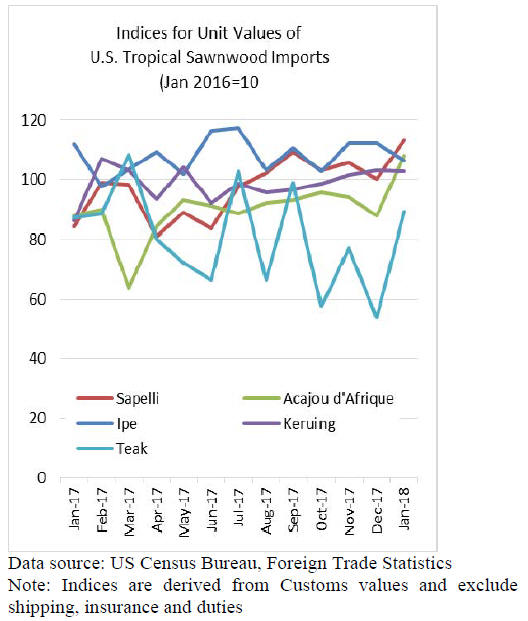|
Report from
North America
Rise in ipe and mahogany imports
The US imported 67,577 cu.m. of temperate and tropical
sawnwood in January. This was 4% less than in January
2017. Imports of tropical species declined more (-19%)
than temperate species compared to January last year.
Tropical sawnwood imports were 18,602 cu.m. in January,
down 6% from December. Almost one third of all tropical
imports came from Brazil. Imports from Brazil increased
in January, the majority being ipe (3,087 cu.m.) and
mahogany (1,345 cu.m.).
US and Cameroon shipped more to Canada in January
Canadian imports of tropical sawnwood were also down in
January. Imports were worth just over US$1 million in
January, down 36% compared to January 2017. Imports
from most countries declined month-on-month except for
imports from the US and Cameroon.
Sapelli sawnwood imports from Cameroon grew despite
an overall decline in Canada¡¯s sapelli imports in January.
Imports from the US were almost all in the virola, imbuia
and balsa category in January.

Lacey Act compliance courses offered by IWPA
The International Wood Products Association (IWPA),
who represents the North American imported wood
products industry, created in 2016 a course on the
requirements of the Lacey Act and due diligence tools
with funding from the U.S. Agency for International
Development.
The course ¡°Wood Trade Compliance Training and Due
Diligence Tools¡± was well-received by importing
companies. Based on feedback from course participants
the IWPA has developed more advanced courses.
The first set of new courses are ¡°Advanced Wood Trade
Compliance¡±, ¡°Audits for the Wood Trade Professional¡±,
and ¡°Key Components of Wood and Forestry Regulatory
Schemes¡±. The Advanced Compliance course will provide
attendees with sourcing strategies, risk assessment
methods, methods to validate supplier compliance, and
updates about regulatory developments and enforcement
actions.
The Audits course has been developed to educate
compliance professionals about the ways audits can be
developed, implemented, and then used to address nonconformities
and take corrective actions. The Regulatory
Schemes course covers the basics of typical forest
regulatory structures to help wood trade professionals
better understand the regulatory environment of their
wood sources.
Rollout of the new courses started in February. The
Advanced Compliance course is a day-long session, while
the other two courses are half-day sessions. More
information about Lacey Act compliance courses as well
as training dates and locations are available at the IWPA
website.
Shipping rates expected to remain low despite
mergers and acquisitions
Import/Export Wood Purchasing News (February/March
2018 issue) provided an overview of major developments
in shipping in 2017 and how they may affect prices and
container trade in 2018.
The number of large shipping lines has continually
decreased through acquisitions and mergers. In 2017
Maersk acquired Hamburg-S¨¹d. Cosco bought OOCL
after absorbing China Shipping in 2016. The three
Japanese carriers KLINE, NYK and MOL have announced
they will merge to become ONE (Ocean Network
Express). In the end three major alliances will represent
approximately 85% of the global container trade in 2018.
At the same time ocean freight rates have been at record
low levels. Rates are not expected to increase much in
2018, despite the shipping line mergers. This is in part
because carriers are ordering larger vessels, which can
hold up to 4,000 containers more than the ships they will
replace. Without an increase in cargo, the larger capacity
will help depress freight rates.
Washington pier the largest Kebony installation in the
US
A recreational waterfront pier in Washington D.C. has the
largest installation of Kebony wood decking and was
featured in an article by Woodworking Network. Kebony
softwood was used for decking, verticals, benches and
cladding throughout. In total Kebony was used over about
10,000 square metres.
The Kebony technology modifies softwoods by
polymerising the wood¡¯s cell wall. According to
Norwegian Kebony, the softwoods reportedly take on the
attributes of tropical hardwood including high durability,
hardness and dimensional stability.
Kebony was also promoted recently as a more sustainable
choice than tropical hardwoods in an in-depth technical
article in Construction Canada, a design-build news source
for construction professionals.
|